Chris Russell
@russ-chris.bsky.social
Desk Editor, @asia.nikkei.com | Oxford Climate Journalism Network 2024 @reutersinstitute.bsky.social
Reposted by Chris Russell
Japan's Komeito withdraws from ruling coalition with Takaichi's LDP
https://asia.nikkei.com/politics/japan-leadership-race/japan-s-komeito-withdraws-from-ruling-coalition-with-takaichi-s-ldp
https://asia.nikkei.com/politics/japan-leadership-race/japan-s-komeito-withdraws-from-ruling-coalition-with-takaichi-s-ldp

Japan's Komeito withdraws from ruling coalition with Takaichi's LDP
Quarter-century of formal partnership comes to end over political funding scandal
asia.nikkei.com
October 10, 2025 at 6:51 AM
Japan's Komeito withdraws from ruling coalition with Takaichi's LDP
https://asia.nikkei.com/politics/japan-leadership-race/japan-s-komeito-withdraws-from-ruling-coalition-with-takaichi-s-ldp
https://asia.nikkei.com/politics/japan-leadership-race/japan-s-komeito-withdraws-from-ruling-coalition-with-takaichi-s-ldp
Reposted by Chris Russell
India's increasing cloudbursts put Himalayan hydropower at risk
https://asia.nikkei.com/business/energy/india-s-increasing-cloudbursts-put-himalayan-hydropower-at-risk
https://asia.nikkei.com/business/energy/india-s-increasing-cloudbursts-put-himalayan-hydropower-at-risk

India's increasing cloudbursts put Himalayan hydropower at risk
Intensifying extreme rains are damaging and disrupting key clean energy source
asia.nikkei.com
September 23, 2025 at 1:39 AM
India's increasing cloudbursts put Himalayan hydropower at risk
https://asia.nikkei.com/business/energy/india-s-increasing-cloudbursts-put-himalayan-hydropower-at-risk
https://asia.nikkei.com/business/energy/india-s-increasing-cloudbursts-put-himalayan-hydropower-at-risk
Reposted by Chris Russell
Whether we aim to reduce atmospheric CO₂ by carbon capture and sequestration (CCS) or CO₂ removal (CDR), we must store the carbon somewhere durably. This new study, led by @gidden.bsky.social, showed that global geologic carbon storage capacity is 10 times less than previous estimates. Not good.

A prudent planetary limit for geologic carbon storage - Nature
A risk-based, spatially explicit analysis of carbon storage in sedimentary basins establishes a prudent planetary limit of around 1,460 Gt of geological carbon storage, which requires making explicit ...
www.nature.com
September 4, 2025 at 7:53 AM
Whether we aim to reduce atmospheric CO₂ by carbon capture and sequestration (CCS) or CO₂ removal (CDR), we must store the carbon somewhere durably. This new study, led by @gidden.bsky.social, showed that global geologic carbon storage capacity is 10 times less than previous estimates. Not good.
Reposted by Chris Russell
WATCH:
Japan just had its hottest summer on record.
With the extreme heat, companies have been taking various steps to keep workers safe and to remain compliant with new government regulations.
Read more here: trib.al/r9SekbO
Japan just had its hottest summer on record.
With the extreme heat, companies have been taking various steps to keep workers safe and to remain compliant with new government regulations.
Read more here: trib.al/r9SekbO
September 1, 2025 at 7:17 AM
WATCH:
Japan just had its hottest summer on record.
With the extreme heat, companies have been taking various steps to keep workers safe and to remain compliant with new government regulations.
Read more here: trib.al/r9SekbO
Japan just had its hottest summer on record.
With the extreme heat, companies have been taking various steps to keep workers safe and to remain compliant with new government regulations.
Read more here: trib.al/r9SekbO
It's against this backdrop that Japan has set out new heat protection regulations for workers. With temperature records also being set across East Asia, other governments are following suit. From "heat holidays" to heat allowances, this is @asia.nikkei.com's look at how the region is responding:
September 1, 2025 at 7:56 AM
It's against this backdrop that Japan has set out new heat protection regulations for workers. With temperature records also being set across East Asia, other governments are following suit. From "heat holidays" to heat allowances, this is @asia.nikkei.com's look at how the region is responding:
The Japan Meteorological Agency has just confirmed this summer was the country's hottest on record, with the average temperature coming in at 2.36 C over the norm for the season.
www.data.jma.go.jp/cpd/longfcst...
www.data.jma.go.jp/cpd/longfcst...
気象庁 | 2025年夏(6月〜8月)の天候
気象庁が提供するページです
www.data.jma.go.jp
September 1, 2025 at 7:52 AM
The Japan Meteorological Agency has just confirmed this summer was the country's hottest on record, with the average temperature coming in at 2.36 C over the norm for the season.
www.data.jma.go.jp/cpd/longfcst...
www.data.jma.go.jp/cpd/longfcst...
Reposted by Chris Russell
Indian AC makers can't keep up with demand driven by hotter summers
https://asia.nikkei.com/Business/Electronics/Indian-AC-makers-can-t-keep-up-with-demand-driven-by-hotter-summers
https://asia.nikkei.com/Business/Electronics/Indian-AC-makers-can-t-keep-up-with-demand-driven-by-hotter-summers
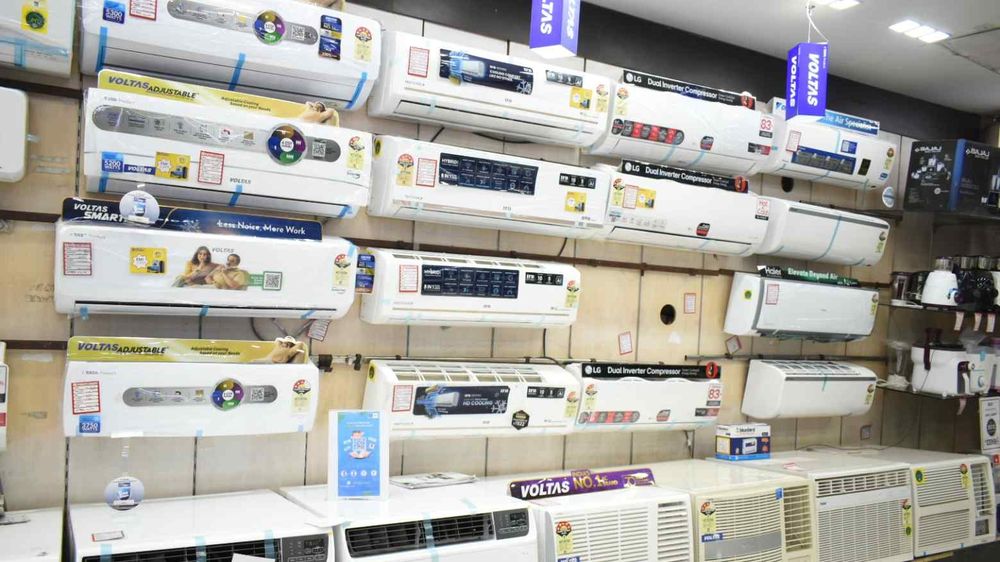
Indian AC makers can't keep up with demand driven by hotter summers
Reliance on Chinese parts limits supply as climate change boosts cooling need
asia.nikkei.com
June 26, 2025 at 7:53 AM
Indian AC makers can't keep up with demand driven by hotter summers
https://asia.nikkei.com/Business/Electronics/Indian-AC-makers-can-t-keep-up-with-demand-driven-by-hotter-summers
https://asia.nikkei.com/Business/Electronics/Indian-AC-makers-can-t-keep-up-with-demand-driven-by-hotter-summers
Reposted by Chris Russell
#Asia, which is warming at nearly twice the global average rate, was "hit hard" by climate change in 2024, says WMO.
earth.org/asias-econom...
earth.org/asias-econom...
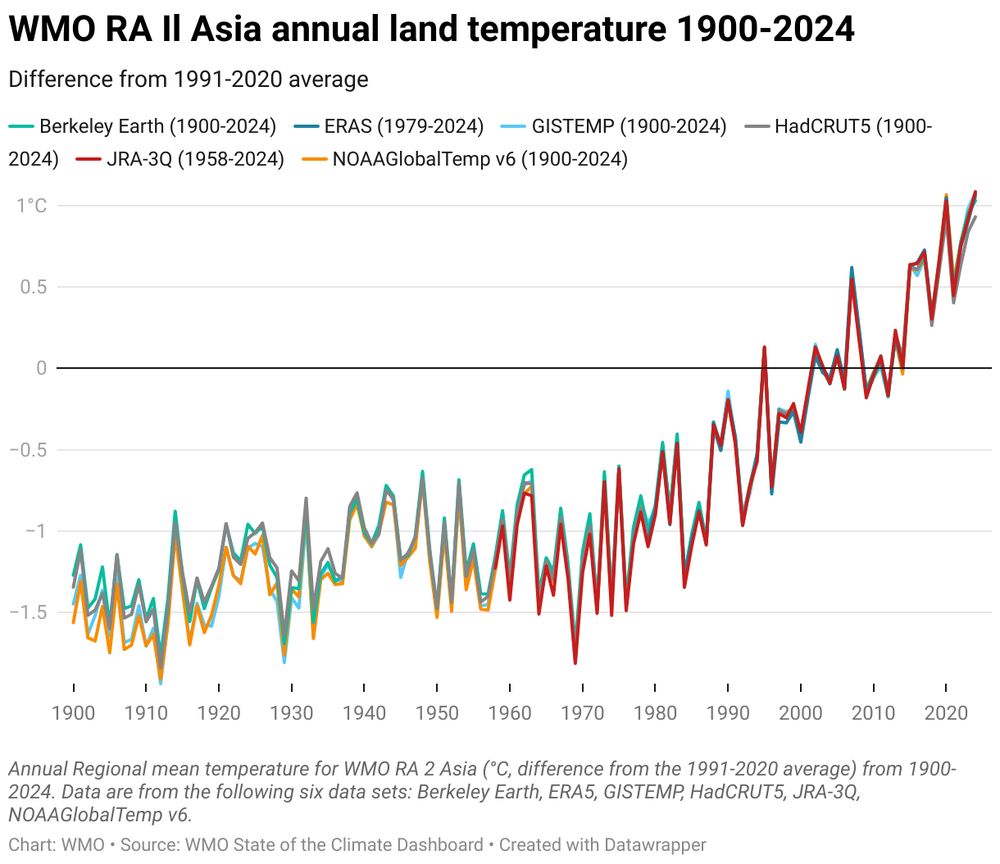
June 24, 2025 at 12:59 AM
#Asia, which is warming at nearly twice the global average rate, was "hit hard" by climate change in 2024, says WMO.
earth.org/asias-econom...
earth.org/asias-econom...
Reposted by Chris Russell
Our new paper updating key metrics in the IPCC is now out, and the news is grim:
⬆️ Human induced warming now at 1.36C
⬆️ Rate of warming now 0.27C / decade
⬆️ Sharp increase in Earth's energy imbalance
⬇️ Remaining 1.5C carbon budget only 130 GtCO2
essd.copernicus.org/...
⬆️ Human induced warming now at 1.36C
⬆️ Rate of warming now 0.27C / decade
⬆️ Sharp increase in Earth's energy imbalance
⬇️ Remaining 1.5C carbon budget only 130 GtCO2
essd.copernicus.org/...
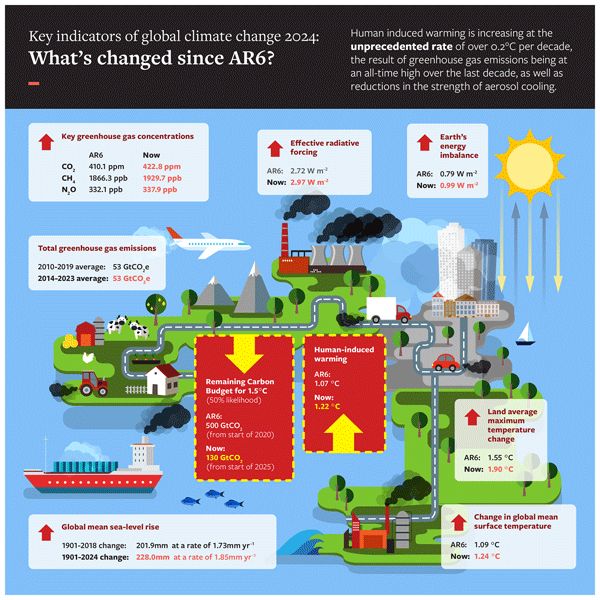
Indicators of Global Climate Change 2024: annual update of key indicators of the state of the climate system and human influence
Abstract. In a rapidly changing climate, evidence-based decision-making benefits from up-to-date and timely information. Here we compile monitoring datasets (published at https://doi.org/10.5281/zenodo.15639576; Smith et al., 2025a) to produce updated estimates for key indicators of the state of the climate system: net emissions of greenhouse gases and short-lived climate forcers, greenhouse gas concentrations, radiative forcing, the Earth's energy imbalance, surface temperature changes, warming attributed to human activities, the remaining carbon budget, and estimates of global temperature extremes. This year, we additionally include indicators for sea-level rise and land precipitation change. We follow methods as closely as possible to those used in the IPCC Sixth Assessment Report (AR6) Working Group One report. The indicators show that human activities are increasing the Earth's energy imbalance and driving faster sea-level rise compared to the AR6 assessment. For the 2015–2024 decade average, observed warming relative to 1850–1900 was 1.24 [1.11 to 1.35] °C, of which 1.22 [1.0 to 1.5] °C was human-induced. The 2024-observed best estimate of global surface temperature (1.52 °C) is well above the best estimate of human-caused warming (1.36 °C). However, the 2024 observed warming can still be regarded as a typical year, considering the human-induced warming level and the state of internal variability associated with the phase of El Niño and Atlantic variability. Human-induced warming has been increasing at a rate that is unprecedented in the instrumental record, reaching 0.27 [0.2–0.4] °C per decade over 2015–2024. This high rate of warming is caused by a combination of greenhouse gas emissions being at an all-time high of 53.6±5.2 Gt CO2e yr−1 over the last decade (2014–2023), as well as reductions in the strength of aerosol cooling. Despite this, there is evidence that the rate of increase in CO2 emissions over the last decade has slowed compared to the 2000s, and depending on societal choices, a continued series of these annual updates over the critical 2020s decade could track decreases or increases in the rate of the climatic changes presented here.
essd.copernicus.org
June 18, 2025 at 11:10 PM
Our new paper updating key metrics in the IPCC is now out, and the news is grim:
⬆️ Human induced warming now at 1.36C
⬆️ Rate of warming now 0.27C / decade
⬆️ Sharp increase in Earth's energy imbalance
⬇️ Remaining 1.5C carbon budget only 130 GtCO2
essd.copernicus.org/...
⬆️ Human induced warming now at 1.36C
⬆️ Rate of warming now 0.27C / decade
⬆️ Sharp increase in Earth's energy imbalance
⬇️ Remaining 1.5C carbon budget only 130 GtCO2
essd.copernicus.org/...
Really good to see a greater effort in Japan to track the influence of climate change on extreme weather. Will be interesting to see how/if this shifts public opinion and debate on climate. www.bloomberg.com/news/article...

Japan Wants a Bigger Role In Science of Extreme Weather Attribution
Nation’s new research center aims to pinpoint the role of climate change in heat waves to typhoons
www.bloomberg.com
May 20, 2025 at 4:38 AM
Really good to see a greater effort in Japan to track the influence of climate change on extreme weather. Will be interesting to see how/if this shifts public opinion and debate on climate. www.bloomberg.com/news/article...
Reposted by Chris Russell
The startup helping rebuild Nepal, one eco-brick at a time
https://asia.nikkei.com/Business/Construction/The-startup-helping-rebuild-Nepal-one-eco-brick-at-a-time
https://asia.nikkei.com/Business/Construction/The-startup-helping-rebuild-Nepal-one-eco-brick-at-a-time
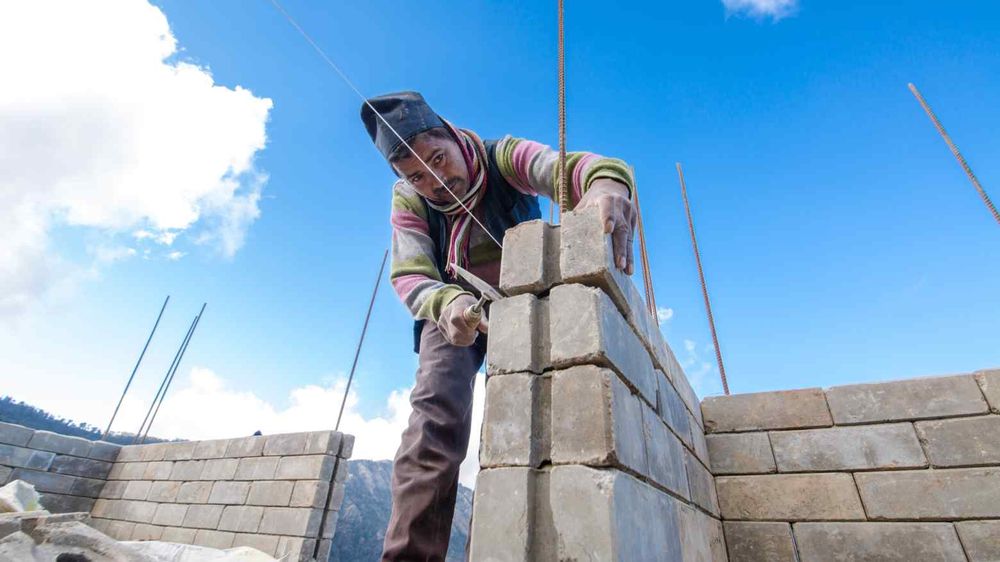
The startup helping rebuild Nepal, one eco-brick at a time
Build Up Nepal's bricks promise to address major source of pollution, CO2
asia.nikkei.com
May 17, 2025 at 5:23 AM
The startup helping rebuild Nepal, one eco-brick at a time
https://asia.nikkei.com/Business/Construction/The-startup-helping-rebuild-Nepal-one-eco-brick-at-a-time
https://asia.nikkei.com/Business/Construction/The-startup-helping-rebuild-Nepal-one-eco-brick-at-a-time
Reposted by Chris Russell
For Japan’s largest utilities, lab-made fuels are a meaningful step toward greener energy that also extends the life of existing fossil-fuel infrastructure. Their critics says they are an expensive distraction.
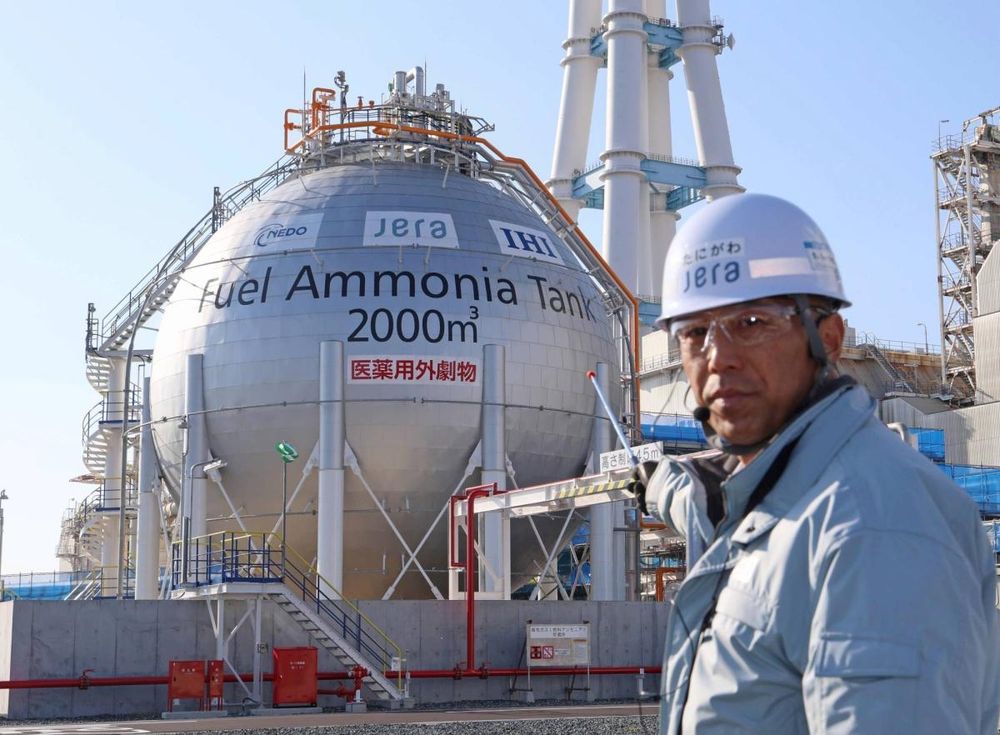
Japan embraces lab-made fuels despite costs and climate concerns
Japanese utilities say e-methane is chemically almost identical to natural gas but is effectively carbon-neutral.
www.japantimes.co.jp
April 21, 2025 at 11:27 PM
For Japan’s largest utilities, lab-made fuels are a meaningful step toward greener energy that also extends the life of existing fossil-fuel infrastructure. Their critics says they are an expensive distraction.
Quick announcement: Pleased to say that last week I joined @asia.nikkei.com as a desk editor. I'll be focused on South Asia, but I'm aiming to keep an eye on climate too.
April 8, 2025 at 3:20 AM
Quick announcement: Pleased to say that last week I joined @asia.nikkei.com as a desk editor. I'll be focused on South Asia, but I'm aiming to keep an eye on climate too.
Reposted by Chris Russell
The IEA has released a new analysis on energy use in 2024, and it's full of interesting data and insights.
I urge people to check it out.
Here are my top-line reactions to it, below. A thread....
www.iea.org/news/growth-...
I urge people to check it out.
Here are my top-line reactions to it, below. A thread....
www.iea.org/news/growth-...

Growth in global energy demand surged in 2024 to almost twice its recent average - News - IEA
Growth in global energy demand surged in 2024 to almost twice its recent average - News from the International Energy Agency
www.iea.org
March 26, 2025 at 7:41 PM
The IEA has released a new analysis on energy use in 2024, and it's full of interesting data and insights.
I urge people to check it out.
Here are my top-line reactions to it, below. A thread....
www.iea.org/news/growth-...
I urge people to check it out.
Here are my top-line reactions to it, below. A thread....
www.iea.org/news/growth-...
Reposted by Chris Russell
NEW: Official advisers CCC say UK shld cut emissions 87% by 2040
⚖️Net cost of net-zero 73% less than thought
💷Total cost to 2050 = £108bn (~£4bn/yr, 0.2% GDP)
🏡🚗H’hold energy/fuel bills to fall £1,400
🔌Electrification is key
THREAD + charts
www.carbonbrief.org/...
1/10
⚖️Net cost of net-zero 73% less than thought
💷Total cost to 2050 = £108bn (~£4bn/yr, 0.2% GDP)
🏡🚗H’hold energy/fuel bills to fall £1,400
🔌Electrification is key
THREAD + charts
www.carbonbrief.org/...
1/10
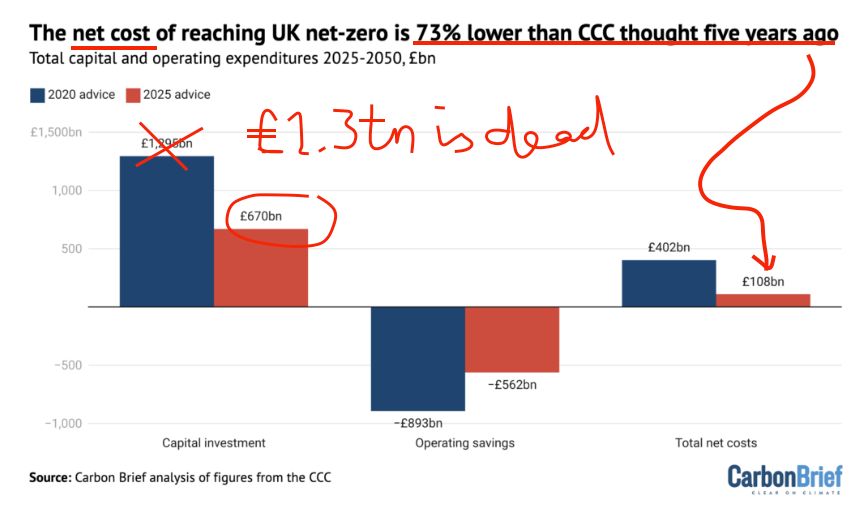
February 26, 2025 at 10:27 AM
NEW: Official advisers CCC say UK shld cut emissions 87% by 2040
⚖️Net cost of net-zero 73% less than thought
💷Total cost to 2050 = £108bn (~£4bn/yr, 0.2% GDP)
🏡🚗H’hold energy/fuel bills to fall £1,400
🔌Electrification is key
THREAD + charts
www.carbonbrief.org/...
1/10
⚖️Net cost of net-zero 73% less than thought
💷Total cost to 2050 = £108bn (~£4bn/yr, 0.2% GDP)
🏡🚗H’hold energy/fuel bills to fall £1,400
🔌Electrification is key
THREAD + charts
www.carbonbrief.org/...
1/10
Reposted by Chris Russell
JAL and ANA both have ambitious climate goals, but slow progress in many areas shows just how challenging decarbonization is for the aviation sector.

Sky not the only limit for JAL and ANA’s climate goals
The airlines' similar but different carbon neutrality plans highlight the difficulty of decarbonization, especially as the sector is now growing again.
buff.ly
February 16, 2025 at 12:02 PM
JAL and ANA both have ambitious climate goals, but slow progress in many areas shows just how challenging decarbonization is for the aviation sector.
Nice working with @gristnews.bsky.social on this story. As someone who has been flexitarian for 5+ years now, I can say myself that the struggle is real when it comes to avoiding animal products. But things are changing — I got a few nice restaurant/bakery tips from this article!
Japan might be famous for sushi and pork ramen, but tourism, climate goals and animal rights concerns are sparking a plant-based renaissance in the country.

In meat- and fish-loving Japan, veganism is making a comeback
Tourism, climate goals and animal rights concerns are sparking a plant-based renaissance in a country famous for sushi and pork ramen.
buff.ly
January 30, 2025 at 4:56 AM
Nice working with @gristnews.bsky.social on this story. As someone who has been flexitarian for 5+ years now, I can say myself that the struggle is real when it comes to avoiding animal products. But things are changing — I got a few nice restaurant/bakery tips from this article!
Reposted by Chris Russell
Japan is investing billions of yen to get carbon capture and storage off the ground in order to keep key, high-emitting industries operating, but the technology is dogged by high costs and uncertainty.
buff.ly
January 26, 2025 at 10:16 AM
Japan is investing billions of yen to get carbon capture and storage off the ground in order to keep key, high-emitting industries operating, but the technology is dogged by high costs and uncertainty.
Presumably Japan wouldn't fit in at the "peak of inflated expectations"
The hydrogen hype cycle and where different countries and technologies are positioned. Nice visualisation by BNEF.

January 17, 2025 at 8:52 AM
Presumably Japan wouldn't fit in at the "peak of inflated expectations"
Reposted by Chris Russell
Today, the Japanese government presented the draft new 2040 generation mix.
40-50% Renewables
20% Nuclear
30-40% Fossil fuel and hydrogen/ammonia
The Japanese government has doubled down on CCS as well as imported hydrogen and ammonia.
www.enecho.meti.go.jp/committee/co...
40-50% Renewables
20% Nuclear
30-40% Fossil fuel and hydrogen/ammonia
The Japanese government has doubled down on CCS as well as imported hydrogen and ammonia.
www.enecho.meti.go.jp/committee/co...
www.enecho.meti.go.jp
December 17, 2024 at 5:36 AM
Today, the Japanese government presented the draft new 2040 generation mix.
40-50% Renewables
20% Nuclear
30-40% Fossil fuel and hydrogen/ammonia
The Japanese government has doubled down on CCS as well as imported hydrogen and ammonia.
www.enecho.meti.go.jp/committee/co...
40-50% Renewables
20% Nuclear
30-40% Fossil fuel and hydrogen/ammonia
The Japanese government has doubled down on CCS as well as imported hydrogen and ammonia.
www.enecho.meti.go.jp/committee/co...
Reposted by Chris Russell
Japan sees nuclear and solar as the cheapest energy sources in 2040
🇯🇵☢️
⚡ The total system cost for nuclear power is the cheapest option in all but one scenario
☀️ Solar power could be cheapest or most expensive depending on scale of intermittent renewable sources on the grid
🇯🇵☢️
⚡ The total system cost for nuclear power is the cheapest option in all but one scenario
☀️ Solar power could be cheapest or most expensive depending on scale of intermittent renewable sources on the grid
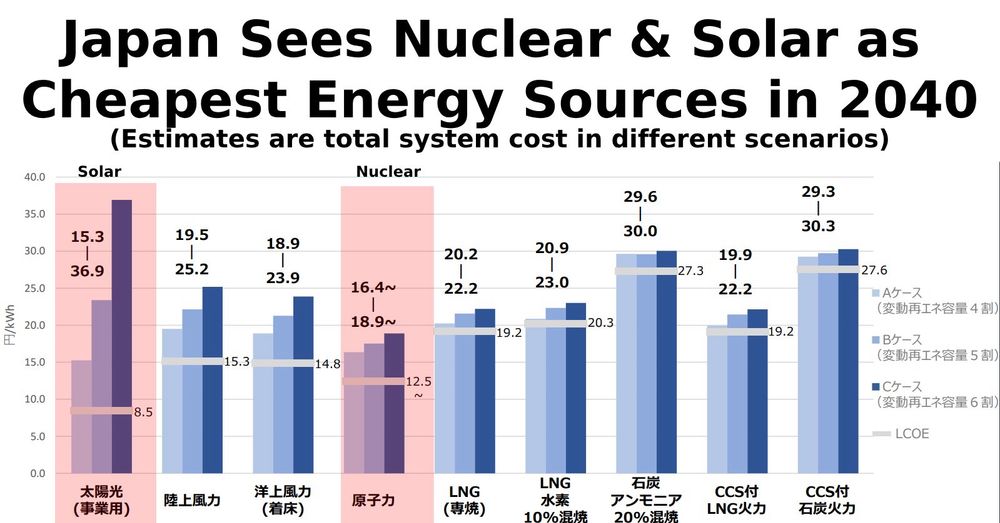
December 16, 2024 at 8:28 AM
Japan sees nuclear and solar as the cheapest energy sources in 2040
🇯🇵☢️
⚡ The total system cost for nuclear power is the cheapest option in all but one scenario
☀️ Solar power could be cheapest or most expensive depending on scale of intermittent renewable sources on the grid
🇯🇵☢️
⚡ The total system cost for nuclear power is the cheapest option in all but one scenario
☀️ Solar power could be cheapest or most expensive depending on scale of intermittent renewable sources on the grid
Reposted by Chris Russell
"Expert" panels are ubiquitous in Japan's government, setting policy directions for everything from energy to public health, but are they fair and balanced? @russ-chris.bsky.social and I examined the question through a recent debate over climate policy-related committees. For @japantimes.co.jp
Debate over Japan's draft proposal on greenhouse gas reductions has spilled over into scrutiny over the decision-making process itself, with businesses and think tanks criticizing the way in which the policy-setting panels are composed and run.

As Japan nears new climate goal, criticism of policy process ramps up
Critics say the process is not intended to facilitate genuine debate, and that those who support the energy status quo are overrepresented on policy panels.
buff.ly
December 12, 2024 at 1:00 AM
"Expert" panels are ubiquitous in Japan's government, setting policy directions for everything from energy to public health, but are they fair and balanced? @russ-chris.bsky.social and I examined the question through a recent debate over climate policy-related committees. For @japantimes.co.jp
Reposted by Chris Russell
🚨 We are thrilled to present the 7th cohort of our Oxford Climate Journalism Network
It includes 34 men and 66 women from dozens of countries and territories. The new members of our climate network will join us in January
Check out our new members reutersinstitute.politics.ox.ac.uk/members-oxfo...
It includes 34 men and 66 women from dozens of countries and territories. The new members of our climate network will join us in January
Check out our new members reutersinstitute.politics.ox.ac.uk/members-oxfo...
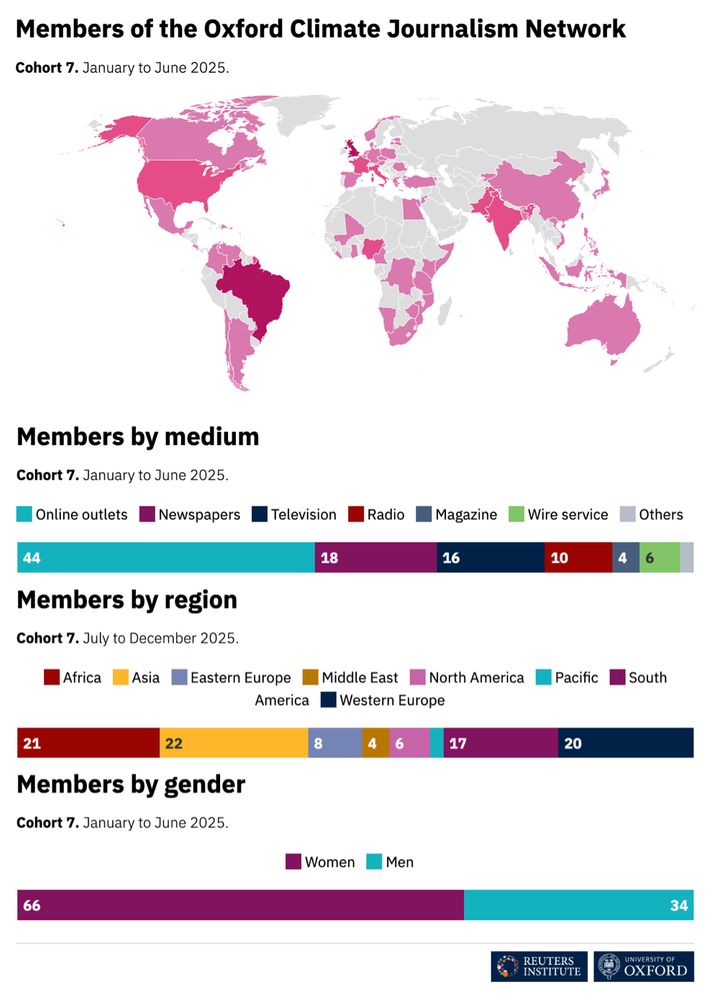
December 6, 2024 at 11:39 AM
🚨 We are thrilled to present the 7th cohort of our Oxford Climate Journalism Network
It includes 34 men and 66 women from dozens of countries and territories. The new members of our climate network will join us in January
Check out our new members reutersinstitute.politics.ox.ac.uk/members-oxfo...
It includes 34 men and 66 women from dozens of countries and territories. The new members of our climate network will join us in January
Check out our new members reutersinstitute.politics.ox.ac.uk/members-oxfo...
Reposted by Chris Russell
Here we are. Pleased to meet you! 👋
November 28, 2024 at 2:13 AM
Here we are. Pleased to meet you! 👋

